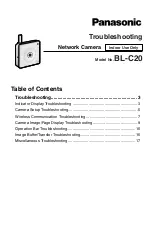
ETHERLINK II - Repeater
Manual
Page 35 of 106
The table presented below contains examples of the correspondence between the data
transmission rates for a modem and transmitted time slots of the E1 stream for this transmission
mode.
Table 3.8 Examples of the correspondence between the data transmission rates for a modem
and transmitted time slots of the E1 stream for this transmission mode in a single-
channel device.
Time slots of E1 streams (first
E1/second E1)
Total number of
transmitted time
slots
Minimal transmission rate in the line
required for transmitting this
number of time slots (
kbit/s
)
0,1,16/0,1,2,3
7
456
0,1,2,3,31/none
5
264
0-29,31/ none
31
1992
0-31/0-31
64
4104
3.6.3.2 Mode of simultaneous transmission of time slots of E1 and Ethernet data
The system supports simultaneous transmission of time slots of E1 streams and Ethernet data
(from the ports WAN1, WAN2, WAN3, WAN4, and the internal Ethernet switch) into an xDSL
stream, i.e., the mode of time slot multiplexing from E1 and Ethernet network interface in the
xDSL stream.
When E1 and Ethernet data are transmitted simultaneously, the distribution of xDSL time slots
is performed as follows:
time slots of the first E1, chosen for transmission in the line interface in the ascending
order, are transmitted in time slots from 0 to m1-1;
time slots of the second E1, chosen for transmission in the line interface in the ascending
order, are transmitted in time slots from m1 to m1+m2-1 (for SubRack and MiniRack
devices);
Ethernet data are transmitted in time slots from m1+m2 to n-1.
Here,
n is the total number of transmitted xDSL time slots;
m1 is the number of time slots from the first E1 selected for transmission into xDSL;
m2 is the number of time slots from the second E1 selected for transmission into xDSL;
Note: A part of time slots of one of E1 interfaces can be used to transmit data from the WAN2
port of the internal Ethernet switch.
















































